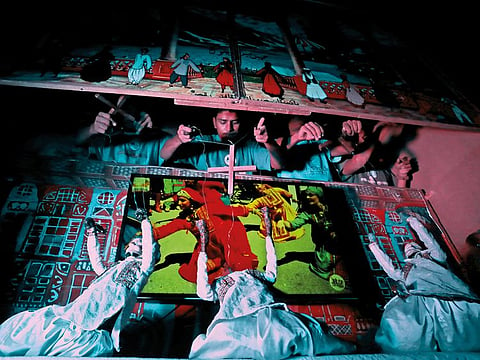Puppeteers lead message of tolerance in Pakistan
Message being spread of making room to accept people of other religions

KARACHI: In the narrow alleys of a poor neighbourhood of the Pakistani city of Karachi, known for drugs, gang wars and low literacy rates, children are learning about peace, love and interfaith tolerance from string puppets.
As the curtains open on stage, a narrator tells the story of ‘Sindbad the Sailor’, a hero of Middle Eastern origin and his journeys around the world in which he meets people of different faiths, languages and religions — who often do not have much tolerance for one another.
“A man is dying and you guys are talking about castes,” the protagonist puppet rebuked a fellow puppet who did not want to save a drowning marionette because it belonged to a lower caste.
“You should be ashamed calling yourself human beings. Humans save humanity not caste,” Sindbad says.
Writer Nouman Mehmood said the story came to mind when his group was conducting an education awareness campaign in some poor neighbourhoods in the city.
They noticed religious and ethnic antagonism in those neighbourhoods and decided to create a show to spread a message of peace, tolerance and harmony.
Pakistan, an overwhelmingly Muslim country of more than 200 million people, has seen repeated attacks on churches, Hindu temples and Sufi shrines in recent years by hardline religious groups and militants.
Conservative religious schools or madrasas are regularly blamed for radicalisation but they are often the only education available to millions of poor children, making alternative messages especially important.
“The basic thing is acceptance. You should have enough room to accept others regardless of whether he is a Christian, without considering he is a Hindu, without considering he is a Sikh,” Mehmood said.
Organised by Thespianz Theatre, the show plans to travel to other poor Karachi neighbourhoods and provinces after its run in the tough Karachi neighbourhood of Lyari.
“There is a message that we should not interfere with others’ religions. We should help each other,” said eighth grade student Abdul Rahim Arshad after watching the show.
“If one deceives us, we should not deceive him back. Instead we should help him.”
Sign up for the Daily Briefing
Get the latest news and updates straight to your inbox



